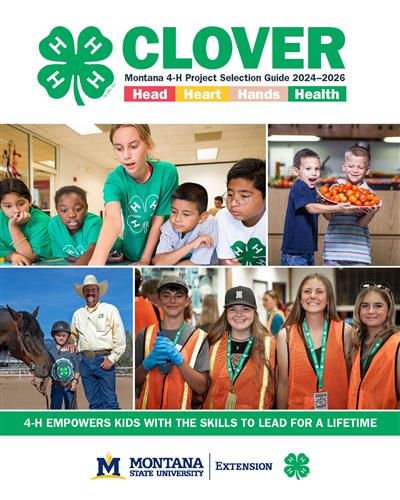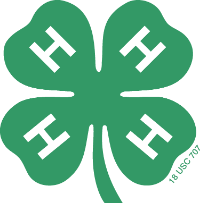4-H Projects
Listed below are all projects offered on a statewide basis to youth enrolling in 4-H clubs in Montana.
Statewide projects are under the priority initiatives of Science, Citizenship and Healthy Living.
Projects should be completed in order, starting with Level 1.
Check with your 4-H leader or MSU Extension agent to see which projects are offered in your area. Not all projects listed on this page may be available in your community.
Some counties and reservations offer projects in addition to those listed here. These projects meet a specific need within the community 4-H program. If you are interested in these, contact your county’s MSU Extension Office to find out more. Many projects also have opportunities for sharing and learning about your unique skills and talents through project achievement programs. Contact your MSU Extension Office to find out how to meet these goals.
As you look for projects, all the information needed to enroll is on its respective webpage. See the example [below].
Example: Understanding 4-H Clover Project Pages
The Subcategory Title section gives a general description of a project, what is involved and what can be learned. As levels increase, so do project requirements and learning challenges.
This section explains what is needed to complete a project book and finish the project.
This section provides a material list for members and leaders. See letter key below:
M = Materials for the 4-H member enrolling in the project
L = Materials for 4-H leaders
S = Supplemental materials for leaders and/or members. These materials are optional.
Example:
M Purr-fect Pals, BU8148 (Material name with link to MSU Extension store webpage, publication number)
L Cat Helper's Guide, BU8151
Montana 4-H curriculum follows the Experiential Learning Model, which ensures "learning by doing." Learn about the Experiential Learning Model and how to use it while planning project activities.
Looking for more project resources? Check out CLOVER by 4-H to find hundreds of online learning activities!
Science
Citizenship
Healthy Living
Additional Projects and Resources
4-H Priority Initiatives
For more than 100 years, 4-H has been a part of local communities trying new and innovative techniques to improve their quality of living. 4-H, with its connection to land-grant universities, has the ability to develop America’s future generation of scientists and engineers. In 4-H, youth use a rich and diverse set of research-based curricula and activities that provide hands-on, real-world experiences delivered in both informal and formal settings. Delivered through the 4-H program, science curriculum offers an extraordinary range of engaging and challenging activities for youth of all ages and abilities. Some examples include Robotics, Animal Quality Assurance and Veterinary Science.
Since its inception, 4-H has placed emphasis on the importance of young people being engaged, well-informed citizens. By connecting to their communities and leaders, youth understand their role in civic affairs and are able to expand their role in decision-making processes. It’s clear that civic engagement provides the foundation that helps youth understand the “big picture” of life and learn the skill sets that allow them to become wise leaders for the 21st century. Citizenship Seminar,service learning and international programs are just a few of the many opportunities to learn about and contribute to our global society.
A core belief of 4-H is health, as evidenced by the four H’s in the 4-H clover: Head, Heart, Hands, and Health. 4-H is committed to the physical, mental and emotional health of our nation’s youth so they may lead healthy and productive lives as youth and into adulthood. 4-H has become a national leader in health-related educational issues including chemical health, mental and emotional health, foods and nutrition, physical health and safety. Examples include Cooking 1-4 and Party Planning.
4-H Membership/Age Requirement
- Any youth who is 5 years old on Oct. 1 may join a 4-H Cloverbud group.
- Cloverbuds is a non-competitive educational program for youth ages 5 to 7 years of age and is the ONLY project they can enroll in.
- Youth age 8 on Oct. 1 may join a regular 4-H club as a full member who can enroll in several different projects. Given the differing maturity and ability of youth this age, a family may choose to have their child continue in a Cloverbud group even though s/he will turn 9 during the coming year. If a youth turns 19 years of age prior to the beginning of the program year (Oct. 1), s/he is not eligible to re-enroll in 4-H unless still in high school.
- Individuals older than 18 years of age who have special needs are eligible to participate in 4-H provided they are still enrolled in high school.
- 4-H membership is open to all eligible youth. The U.S. Department of Agriculture (USDA), Montana State University and Montana State University Extension prohibit discrimination in all of their programs and activities on the basis of race, color, national origin, gender, religion, age, disability, political beliefs, sexual orientation, and marital and family status.
- In recognition of the educational and developmental needs of youth, a general guideline is listed below to help determine which level of projects a youth might be enrolled in based on age.
- Individuals older than 18 years of age who have special needs are eligible to participate in 4-H provided they are still enrolled in high school.
Classifications Age Range
Cloverbuds 5 to 7 years old
Junior/ Intermediate 8 to 13 years old
Senior 14 to 19 years old
4-H Volunteerism Opportunities
Volunteerism and Leadership involves youth and adults in significant roles where they can help facilitate the growth and success of others. Opportunities to contribute in meaningful ways to yoru club, your community, your country and your world can be varied and numerous. Through these projects, you can help others, serve as a mentor, tutor or coach, and fill important leadership roles that contribute to the overall vitality of your community.
Learn how you can volunteer with Montana 4-H.
Keeping Records
Keeping records is an important part of completing each project. They help you set goals, keep track of your attendance at meetings, record your demonstrations or talks and a whole lot more.
All 4-H projects require the use of record books.
Curriculum "In the Works"
The following projects are currently under review with the Montana Curriculum Advisory Team, and therefore may have updated curricular resources coming within the next few years. MSU Extension Offices should take this into consideration when making bulk orders:
- 4-H Family Handbook
- Animal Quality Assurance
- Baking
- Beef
- Blacksmithing
- Cake Decorating
- Clover Communications & Clover Materials
- Cooking
- Crochet
- Design Your Own
- Dog Obedience
- Embroidery
- Exploring the Treasures of 4-H
- Food Preservation
- Goat
- Interstate Exchange & Hosting
- Knitting
- Mental Health
- Officer Books
- Quilting
- Sheep
- Sports Nutrition
- Wildlife 1
Feedback on Montana 4-H Curricular Resources
We want to hear from you! Your insights provide fresh ideas for our curricular resources, and ensure that the content is engaging, accurate, and relevant.
Curricular Resources include project books, volunteer resources, new agent guides, and any other published resource provided by Montana 4-H to support its members, volunteers, faculty, and staff in the running of 4-H programs.
Upon submission, your feedback will be sent to the Montana Curriculum Advisory Team for review.


